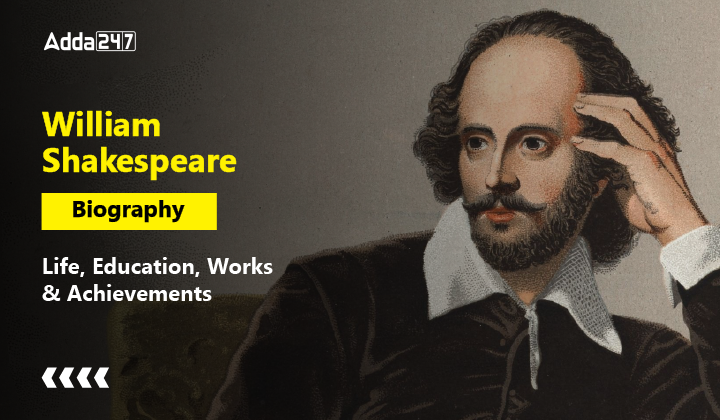Table of Contents
William Shakespeare is the most famous writer of all time, regardless of language or tradition. Whether or not you read literature, you are bound to read his work even in school. Apart from this, he is highly crucial for UGC NET as questions about his life, numerous works, and even events related to him are asked every year. However, although he is a famous writer, people don’t know much about his life and education. So, let’s deeply dive into William Shakespeare’s Biography, life, education, works, and other miscellaneous things.
UGC NET English Literature Notes
William Shakespeare’s Life (1564-1616)
Even though a great deal of information is known to us about his life, one thing to note is many of these facts are not concrete, and thus experts do not agree on many things. Plenty of facts are a fair estimation, like his birth date, his play being performed, and more. With that out of the way, let’s start with his birth date, experts believe he may have been born on April 23rd April. Coincidently, the 23rd of April 1616 is when Shakespeare died. However, from the church record, we learn that he was baptized on the 26th, 1564, in the parish church at Stratford-on Avon. This is why he is also known as Bard-of-Avon.
He married at the age of 18. A bond dated 28 November 1582, clearly states the evidence of Shakespeare’s marriage to Anne Hathaway of Stratford. One fascinating piece of trivia is that the bride was 8 years older than Shakespeare. He had three children with her, a daughter named Susana and twins Hamnet and Judith.
| William Shakespeare’s Life in Chronology | |
| Date | Event |
| 1564 | William Shakespeare is baptized in Stratford-upon-Avon, England. |
| 1582 | At the age of 18, Shakespeare marries Anne Hathaway, who is eight years older than him. |
| 1583 | The couple’s first child, Susanna, is born. |
| 1585-1592 | Referred to as Shakespeare’s Lost Years. Nothing concrete is known. During this phase, he began a successful career in London as an actor, writer, and part-owner of a playing company called the Lord Chamberlain’s Men. |
| 1589-1613 | Shakespeare produced most of his works. |
| 1594 onwards | Shakespeare’s plays were performed only by the Lord Chamberlain’s Men. |
| 1597 | He bought the second-largest house in Stratford. |
| 1599 | A partnership of company members built their own theater named Globe at the south bank of the River Thames. |
| 1616 | William Shakespeare dies in Stratford-upon-Avon at the age of 52 within a month of signing his will for unknown reasons. He is buried in the Holy Trinity Church in Stratford-upon-Avon. |
William Shakespeare Education
Not much is known about his education and academic pursuits, if any, he was involved in. It is believed that early on, Shakespeare followed the occupation of a butcher, a glover, and a farmer, just like his father. It is widely accepted that he attended the grammar school of the town, of Stratford, where he would have been taught Latin, rhetoric, and classical literature. His contemporary and great scholar, Ben Jonson, confirms that Shakespeare knew “small Latin and less Greek.” Barring these facts, there is hardly any concrete evidence of any other educational pursuit of Shakespeare.
William Shakespeare Works
William Shakespeare wrote most of his work during the period of 1592-1611. During this phase, he wrote comedies, historical plays, and great tragedies. However, he also wrote two long narrative poems, namely “Venus and Adonis” (1593) and “The Rape of Lucrece” (1594). In 1609, a collection of Shakespeare’s sonnets was printed by Thomas Thorpe, who dedicated the volume to a certain “Mr W.H.” as being “the online begetter” of the sonnets. The identity of Mr W.H. is not known. Given all the manuscripts of the plays have perished, the order of the play is an estimation based on various evidences of when the play was performed among other things. With that in mind, let’s look at the order of his plays.
| William Shakespeare’s Works in Chronology | |
| Dates of Play | Works |
| 1591-1592 | Henry VI Part 1 Henry VI Part 2 Henry VI Part 3 |
| 1593 | Richard III The Comedy of Errors |
| 1594 | Titus Andronicus The Taming of the Shrew Love’s Labour’s Lost Romeo and Juliet |
| 1595 | A Midsummer Night’s Dream The Two Gentlemen of Verona King John |
| 1596 | Richard II The Merchant of Venice |
| 1597 | Henry IV Part 1 |
| 1598 | Henry IV Part 2 Much Ado About Noting |
| 1599 | Henry V Julius Caesar |
| 1600 | The Merry Wives of Windsor As You Like It |
| 1601 | Hamlet Twelfth Night |
| 1602 | Troilus and Cressida All’s Well That Ends Well |
| 1604 | Measure of Measure Othello |
| 1605 | Macbeth King Lear |
| 1606 | Antony and Cleopatra Coriolanus |
| 1607 | Timon of Athens (unfinished) |
| 1608 | Pericles |
| 1609 | Cymbeline |
| 1610 | The Winter’s Tale |
| 1611 | The Tempest |
| 1613 | Henry VIII (in part) |
William Shakespeare’s Achievements and Influence
William Shakespeare’s achievements and influence in the world of literature and the arts are immeasurable. As a playwright, he wrote some of the most iconic and enduring works in the English language, including “Romeo and Juliet,” “Hamlet,” and “Macbeth,” exploring themes of love, ambition, and the human condition with unmatched depth and complexity.
His innovative use of language, including the invention of new words and phrases, enriched the English vocabulary. Shakespeare’s influence extends beyond literature into theater, as his plays continue to be performed globally, shaping the way we understand and appreciate drama. Moreover, his profound insights into human nature and society remain relevant, making him a timeless source of inspiration for writers, artists, and thinkers across generations.
William Shakespeare Death
In the early 17th century, Shakespeare retired to his hometown of Stratford, where he invested in real estate and became a respected figure in the community. He died on April 23, 1616, at the age of 52. The cause of his death remains unknown, though some theories suggest it may have been related to illness. Shakespeare’s legacy endures today, and his works continue to captivate audiences, inspire writers, and leave a profound impact on the world of literature and the performing arts.
Download UGC NET English Study Notes PDF
The direct link to download UGC NET English Study Notes PDF has been mentioned below. Download William Shakespeare Biography: Life, Education, Works & Achievements Study Notes to learn more.
Download William Shakespeare Biography Life Study Notes PDF




 UGC NET Teaching Aptitude Questions Answ...
UGC NET Teaching Aptitude Questions Answ...
 What is Soil Pollution - Causes, Effects...
What is Soil Pollution - Causes, Effects...
 UGC NET Philosophy Syllabus 2025 PDF Dow...
UGC NET Philosophy Syllabus 2025 PDF Dow...












